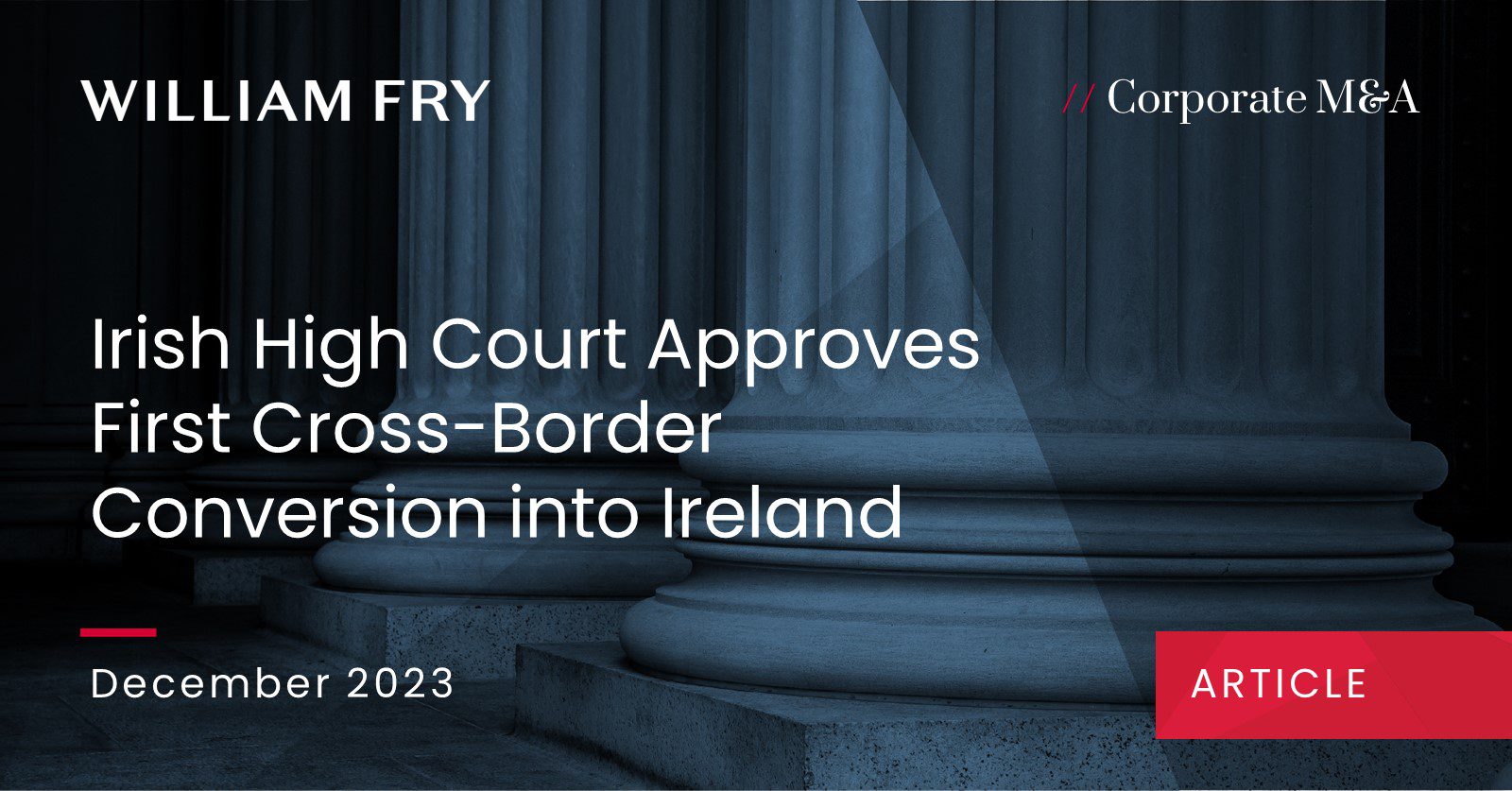The Irish High Court (Court) recently made an Order under Regulation 20 of the European Union (Cross-Border Conversions, Mergers and Divisions) Regulations 2023 (as amended) (Mobility Regulations), approving the first cross-border conversion of an entity incorporated in another EEA member state into Ireland.
On 30 November 2023, Mr Justice McDonald made the novel order approving a proposed cross-border conversion to be undertaken by Elavon European Holdings B.V. (Elavon), whereby Elavon would convert from a Dutch limited company into a private company limited by shares registered in Ireland under the Companies Act 2014 (Conversion). William Fry is pleased to have advised Elavon in connection with the Conversion.
The Mobility Regulations:
Our insurance colleagues previously reported on the Mobility Regulations and their impact on the (Re)Insurance sector. This article provides background on the Mobility Regulations and the introduction of cross-border conversions into Irish law.
Since the enactment of the Mobility Regulations in May 2023, the Court has had the opportunity to consider applications from Irish limited companies seeking to convert into a company registered in another EEA member state. Elavon’s application was the first application to consider the reverse of this situation, that is, where an entity incorporated in another EEA member state is seeking an Order from the Court approving its conversion into an Irish company.
Where the converting company is an Irish company, it must make an application to the Court under Regulation 17 of the Mobility Regulations, to obtain a pre-conversion certificate before taking the relevant steps in the destination EEA member state. Where the converting company is an entity incorporated in another EEA member state (as was the case here), it must make an application to the Court for an Order approving its conversion into Ireland under Regulation 20 of the Mobility Regulations, after it has obtained a pre-conversion certificate in the departure EEA member state.
The Application:
In this case, Elavon (a Dutch converting company) sought an Order under Regulation 20 of the Mobility Regulations approving the Conversion. Given the commercial nature of this application, a parallel application for entry into the Commercial Division of the High Court was sought and granted so that the application could be dealt with in an efficient and timely manner.
In considering applications of this nature under Regulation 20, the Court must examine the legality of the procedure adopted to complete the cross-border conversion, including the proposed formation of the Irish-incorporated company which will result from the completion of the conversion. The Court may either (a) make an order approving the cross-border conversion if it is satisfied that certain pre-conversion requirements have been met; or (b) if it is not so satisfied, refuse to make an order approving the cross-border conversion.
After considering the legality of the Conversion, it was approved by the Court. The Court concluded that Elavon had fulfilled the necessary pre-conversion requirements provided for in Regulation 20 of the Mobility Regulations, namely:
- Elavon had submitted to the Court, the draft terms of the cross-border conversion that had been approved by Elavon’s sole shareholder;
- the proposed converted company would be an Irish company;
- a pre-conversion certificate had been obtained by Elavon by the authority designated for that purpose in the Netherlands;
- the draft terms of conversion to which the pre-conversion certificate related were the same draft terms of conversion that had been approved by Elavon’s sole shareholder; and
- any arrangements for employee participation in the converted company had been determined.
The Conversion will not result in the dissolution of Elavon as it will retain its legal personality and will convert its legal form into an Irish company and transfer its registered office to Ireland. As of the effective date, Elavon will continue in the form of a “private company limited by shares” under the laws of Ireland, albeit with a different name.
Conclusion:
This successful application demonstrates the availability of a straightforward and streamlined cross-border conversion process for entities considering moving their businesses and assets from one EEA member state to another state within the EEA. It also confirms the ability of the Irish courts to deal expediently with progressive applications of this nature.
The introduction of the cross-border procedure presents a significant commercial opportunity across the EEA and will likely increase conversions taking place as more companies begin to avail of the process.
Ireland, with its favourable corporate environment, will no doubt benefit from the availability of this new procedure. We expect to see more companies selecting Ireland as their destination of choice when seeking to move jurisdictions within the EEA.
If you wish to discuss this topic, please contact Mark Quealy, Ruairi Rynn, Leanne Ennis, or your usual William Fry contact.
Contributed by Harry Quinn and Leanne Ennis




